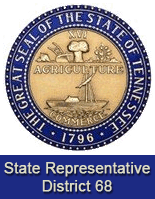Written by Curtis Johnson
Tennessee State Representative
 Nashville, TN – The first session of the 110th Tennessee General Assembly adjourned on May 10th, 2017, after passing major legislation that will benefit Tennesseans for generations to come. This is Part 2 of a 12 Part report.
Nashville, TN – The first session of the 110th Tennessee General Assembly adjourned on May 10th, 2017, after passing major legislation that will benefit Tennesseans for generations to come. This is Part 2 of a 12 Part report.
This includes a measure making Tennessee the first state in the nation to offer all adults without a degree tuition-free access to community college; a new law rebuilding a safe and reliable transportation network, while reallocating revenues to maximize taxpayers’ return on that investment; and a bill which provides a responsible path to improve access to broadband through investment, deregulation, and education.
Action in the General Assembly also included passage of a balanced budget which takes on no new debt, as well as legislation protecting the elderly, enhancing the state’s robust job growth, cracking down on crime, and boosting efforts as the fastest improving state in the nation in K-12 student achievement. Following is a report on key legislation passed this year.

Hall Tax Relief / 100 years or Older
In other action on tax relief, the General Assembly voted to exempt any taxpayer 100 years of age or older from the Hall Income Tax.
House Bill 331 / Status: PC 453 / Effective Date: May 25th, 2017.
Transportation / Drivers / Other
Budget — The 2016-2017 appropriations bill restores $120 million in nonrecurring funds to the Highway Fund and appropriates an additional $55 million for TDOT’s state aid program. It also provides $120 million to fully restore previous transfers from the highway fund to the general fund.
High Priority Bridges — The General Assembly approved legislation in 2017 which authorizes the Tennessee Department of Transportation (TDOT) to pay up to 100 percent of the cost to repair or replace bridges on local roadways through a new category in the state-aid highway program, a move to help avoid local property tax increases for repairs. Two hundred of the state’s 526 structurally deficient bridges are on local roads and have been weight-posted. The legislation also gives TDOT the authority to maintain local roadways within the borders of state parks. There has been a longstanding issue related to who is responsible for maintaining these roads since they are local roads within state-operated parks.
House Bill 533 / Status: PC 425 / Effective Date: July 1st, 2017.
County Road Relief Act
Legislation was passed continuing for another two years the way Tennessee manages its State Aid Road Grant Program to make it easier for counties to access state funds to upgrade, repair, and improve local roads. It continues the County Road Relief Act of 2015 which allows a county to use state highway aid for a project as long as the county contributes at least two percent of the approved project cost or provides in-kind work as approved by the TDOT. The law was previously set to expire in July.
HB 1097 / Status: PC 442 / Effective Date: Upon becoming law on May 25th, 2017.
Transportation Funding / Federal
A resolution was passed which urges President Donald Trump and the United States Congress to establish a transportation block grant funding program for distribution to the states. It also urges the enactment of legislation to repeal all federal mandates, either by statute, rule, or policy, that dictate the expenditure of federal transportation funding.
Senate Joint Resolution 59 / by Beavers, Bell, Bowling, Crowe, Gardenhire, Jackson, Roberts, Southerland, Bailey / Status: Signed by Gov. on May 18th.
Autonomous Vehicles
A major new law was approved this year which establishes certain procedures for manufacturers and others to operate ADS (Automated Driving System) vehicles in Tennessee. In addition, ADS-operated vehicles must have an instrument of insurance, surety bond, or proof of self-insurance in the amount of at least $5 million under the measure to ensure coverage in the event of an accident.
The action comes as Tennessee continues to grow as a major U.S. automotive hub. Eleven states and the District of Columbia have passed legislation related to autonomous vehicles, with similar executive orders in two more states. In addition, the National Highway Traffic Safety Administration released the first iteration of its “Federal Automated Vehicles Policy” last year with annual updates expected.
House Bill 381 / Status: PC 474 / Effective Date: Upon becoming law on June 6th, 2017.
Good Samaritas / Move Over Law
Legislation extending Tennessee’s “Move Over Law” to include good Samaritans who stop to help a distressed motorist passed during the 2016 session of the 109th General Assembly. The new law applies when flashing lights are displayed to indicate an emergency.
House Bill 1378 / Status: PC 95 / Effective Date: July 1st, 2017.
License Plates / “In God We Trust”
A new law which gives motor vehicle owners in Tennessee the option to obtain a license plate with the nation’s official motto “In God We Trust” has been approved. The motto was adopted by the 84th Congress in 1956 but has appeared on U.S. coins since 1864. It has also appeared on the nation’s paper currency since 1957. Under the new law, the request for the plate can be made at the time the owner’s license is issued or renewed on or after the bill’s effective date of July 1st, 2017.
House Bill 26 / Status: PC 429 / Effective Date: Shall apply to plates issued or renewed on or after July 1st, 2017.
Driver’s License / Underage Drinking
Legislation advanced through the General Assembly this year requiring all new drivers’ licenses issued to persons under the age of 21 in Tennessee be printed in a vertical format to help businesses easily identify those who cannot drink alcohol.
Presently, a tiny red bar along the side of the photo on the license indicates a person is under the age of 21.
In 2016, there were 28 traffic fatalities in Tennessee with youth aged 15 to 20 years old measuring a blood-alcohol level greater than .01 percent. Reports also indicate that the percentage of young Tennesseans ages 12 to 20 who consumed alcohol in the past month was almost 17 percent. More than two-thirds of the states across the nation have vertical licenses for drivers under the age of 21.
The new law allows drivers the option to change their license to horizontal upon turning age 21 for the reduced cost of a duplicate license.
House Bill 397 / Status: PC 388 / Effective Date: For the purpose of promulgating rules, forms, and procedures and making necessary provisions for implementation of this act, this act shall take effect upon becoming a law, the public welfare requiring it. For all other purposes, this act shall take effect thirty (30) days after the date upon which the commissioner of safety provides written notification to the secretary of state and the executive secretary of the Tennessee code commission that the department of safety’s driver license program is capable of implementing this act or it shall take effect on July 1st, 2018, whichever is earlier.
DUI Memorial Signing Program
A bill enhancing Tennessee’s Driving Under the Influence (DUI) memorial signing program was approved. The new law amends the Tyler Head Law, passed by the General Assembly last year, to ensure DUI victims’ families have the opportunity to have a memorial sign erected in their family member’s honor.
House Bill 21 / Status: PC 157 / Effective Date: Upon becoming law on April 24th, 2017.
DUI / SCOTUS Decision
Legislation which aligns Tennessee law with the Supreme Court decision in Birchfield vs. North Dakota was approved during the 2017 session. Under present law, any individual who drives a motor vehicle is considered to have given consent to testing for the purpose of determining alcohol levels or drug content, or both, of that person’s blood.
This new statute makes the existing implied consent law only applicable to breath tests and establishes that consent or warrant must be obtained before conducting a blood test. In the cases where exigent circumstances are present the warrant requirement may be waived. In addition, the legislation states that if an operator of a vehicle is not properly informed of the consequences of refusing to submit to a breath test, then the court does not have the authority to suspend the operator’s license or require the installment of an interlock device.
House Bill 39 / Status: PC 304 / Effective Date: July 1st, 2017.



